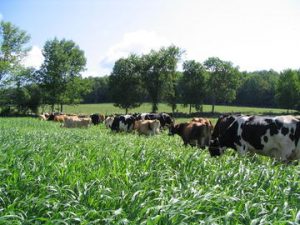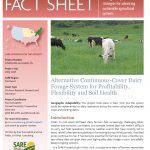Continuous-Cover Dairy Forage System for Profitability, Flexibility and Soil Health
Small- to mid-sized Northeast dairy farmers face increasingly challenging constraints from a limited labor supply, extreme weather events and steadily rising feed prices. As a result, farmers need a flexible, more resilient system where they can grow their own high-quality dairy forage in corn- and alfalfa-based cropping systems.
A new SARE fact sheet, Alternative Continuous-Cover Dairy Forage System for Profitability, Flexibility and Soil Health, describes such a system. One farmer increased net income $531 per acre after implementing the alternative continuous-cover forage (ACCF) system in collaboration with Cornell University Cooperative Extension researchers.
Based on soil health management and expanded rotations that include winter rye, oats, triticale and brown midrib sorghum sudangrass, the ACCF system results in forage quality and yields that are comparable to traditional cropping systems.
Alternative Continuous-Cover Dairy Forage System for Profitability, Flexibility and Soil Health, free to download online, is based on a SARE-funded study in New York that brought together a cooperative team of farmers, researchers and consultants to find alternatives to the traditional crop rotation of corn silage for three or more years without the use of cover crops. The SARE project used a case study model, engaging farmers to employ the ACCF system on their farms and gathering data on soil health, crop performance, forage quality, nitrogen leaching and economics.
The ACCF system has multiple benefits for the grower: flexibility in planting and harvesting times and methods; high-quality yields; and extension of the growing season, particularly into slump periods. With its year-round soil cover and adaptability to no-till planting methods, ACCF also provides many environmental benefits: Living roots improve soil porosity and resilience against compaction; continuous cover helps reduce soil erosion and keep nutrients on the field; and soil quality is improved.
Last, but not least, ACCF also provides economic benefits. Researchers showed that ACCF can improve the bottom line by increasing milk production and potentially reducing the need to purchase supplemental grain and/or forage.
Want more information? Visit SARE’s database of projects for research reports on this project: ONE03-002 and LNE05-215. For practical information, check out Dairy Your Way, a guide to alternative production strategies for Midwestern farmers; and Sustainable 12 Aprils Dairy Grazing, a video of a South Carolina farmer’s year-round forage system.
